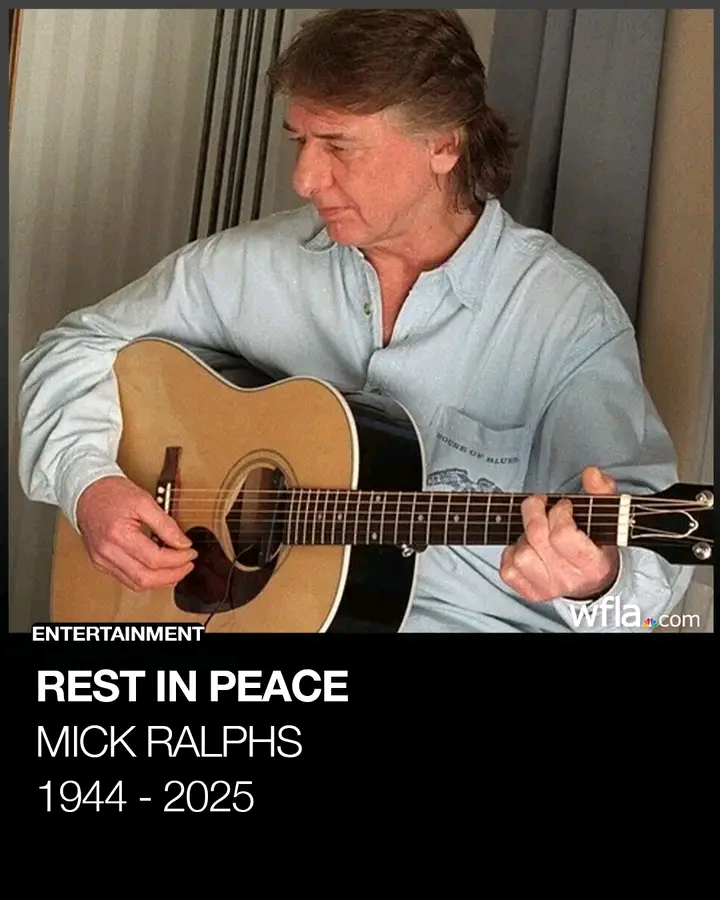REST IN PEACE: Mick Ralphs, Guitar Legend and Founding Member of Bad Company and Mott the Hoople, Dies at 80 in…
The rock world is in mourning today following the death of Mick Ralphs, the celebrated guitarist, songwriter, and founding member of both Bad Company and Mott the Hoople. Ralphs passed away peacefully at the age of 80, surrounded by family, according to a statement released by his publicist early this morning. Though no official cause of death has been announced, Ralphs had been in declining health since suffering a stroke in 2016.
A towering figure in British rock history, Mick Ralphs leaves behind a monumental legacy that helped shape the sound of the 1970s and beyond. From the glam-fueled swagger of Mott the Hoople to the bluesy hard rock anthems of Bad Company, Ralphs’ guitar work and songwriting were instrumental in crafting the gritty elegance of classic rock.
A FOUNDING FORCE
Born Michael Geoffrey Ralphs on March 31, 1945, in Herefordshire, England, Ralphs began playing guitar in his early teens and never looked back. In 1969, he co-founded Mott the Hoople, a band that would go on to blend glam rock, proto-punk, and working-class poetry into an explosive formula. Their 1972 hit “All the Young Dudes” — written by David Bowie — remains a defining anthem of the era, but it was Ralphs’ dynamic guitar contributions on tracks like “Rock and Roll Queen” and “Ready for Love” that gave the band its muscular edge.
In 1973, Ralphs left Mott the Hoople to pursue a new musical vision. Teaming up with Free’s former vocalist Paul Rodgers, drummer Simon Kirke, and bassist Boz Burrell, he co-founded Bad Company — a band that would become one of the first signed to Led Zeppelin’s Swan Song label and go on to sell millions of records worldwide.
BAD COMPANY, GREAT SONGS
With Ralphs providing signature riffs and songwriting alongside Rodgers, Bad Company released their self-titled debut in 1974. The album, now considered a rock classic, spawned iconic tracks like “Can’t Get Enough” — penned by Ralphs — and “Movin’ On.” The band’s tight musicianship and bluesy power became the blueprint for arena rock.
Ralphs’ playing was never about flashy solos or guitar heroics. Instead, his style was rooted in feel, tone, and restraint. Whether coaxing moody textures out of his Gibson Les Paul or driving a song with a chunky rhythm, Ralphs had the rare ability to serve the song completely.
“He was one of the most tasteful players I ever worked with,” said Paul Rodgers in a statement. “Mick had a way of letting his guitar speak — not shouting, not screaming, but singing. I’ve lost a brother.”
QUIET STRENGTH, LASTING IMPACT
Despite his fame, Ralphs was known for his humility and private nature. He often shunned the spotlight, preferring to let the music do the talking. Fans remember him not only for his guitar work but also for his soft-spoken demeanor and dry sense of humor.
After stepping away from Bad Company in the 1980s, Ralphs remained active in various projects, reuniting occasionally with the band for tours and special performances. His last public performance with Bad Company was in 2016, just months before the stroke that would end his touring career.
“I just wanted to make good music, you know?” Ralphs once told Classic Rock Magazine. “Didn’t need to be a star, just wanted to make something that lasted.”
TRIBUTES POUR IN
Tributes have flooded social media from across the rock community. Guitarist Joe Bonamassa tweeted: “Mick Ralphs was one of the greats. The riffs, the tone, the soul — all impeccable. RIP to a legend.”
Def Leppard’s Phil Collen called Ralphs “an architect of British rock guitar,” while Slash posted a black-and-white photo of Ralphs with the caption, “Respect and riffs forever. RIP Mick Ralphs.”
The official Bad Company and Mott the Hoople social media pages changed their banners to black and white memorial photos of Ralphs, with simple messages: “Thank you, Mick.”
LEGACY ETCHED IN VINYL AND MEMORY
In an age of overproduced soundscapes and fleeting fame, Mick Ralphs stood as a reminder of what mattered: honest songwriting, great tone, and letting the guitar say what words couldn’t. His songs — “Can’t Get Enough,” “Feel Like Makin’ Love,” “Ready for Love” — still blare from radios and stages, as timeless as the man who wrote them.
Mick Ralphs is survived by two sons and a lifetime of music that helped define a generation. Funeral arrangements will be announced in the coming days.
Rest in peace, Mick Ralphs. The riffs will echo on.
